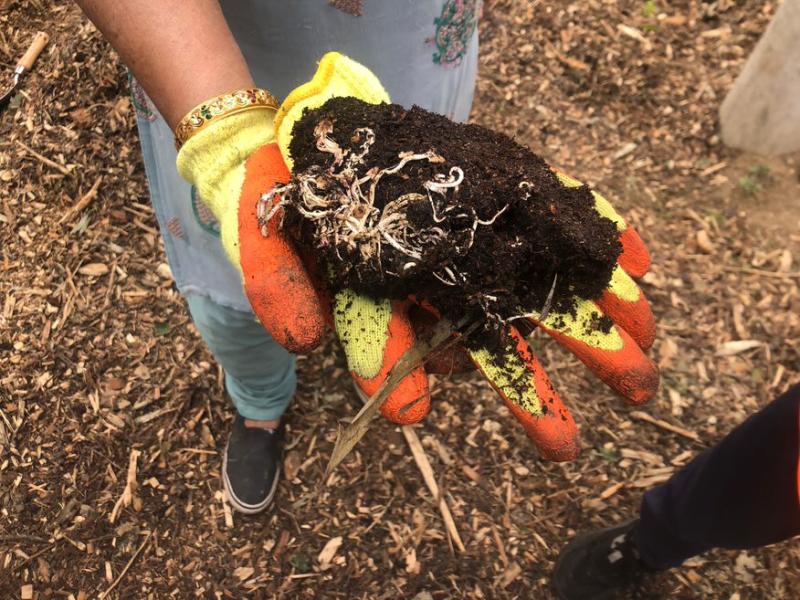Mary Stevens, Experiments Programme Manager10 Jan 2023
In 2022 we ran our first micro-granting scheme: the Local Nature Innovation Fund. Its aim was to help us understand what works for engaging under-represented audiences in nature connection activities and to support new approaches to nature protection or restoration. It was also an opportunity for us to try out a new approach to catalysing innovation and we discovered that micro-granting is a useful tool for NGOs looking to nurture change at the grassroots.
Nurturing the seeds
The language used to describe innovation management often draws on metaphors from the living world: we are creating the conditions for flourishing by tending a garden or observing and managing the flow of resources in a forest. These metaphors reflect the fact that we are working with complex and inter-dependent systems, we don’t know which interventions will work best or what will flourish.
As a small team, we know that we can learn fastest and have most impact when we amplify the work of others already taking action. Providing emerging seedlings with the space, light and nutrients they need. The Local Nature Innovation Fund was our first experiment in using small grants of up to £1000 to give emerging pioneers an early-stage boost. We’ve set out elsewhere what we’ve learned about the practice of running a fund. But here are five reasons why you might choose this approach in the first place.
Learning through doing together is an important part of a discovery process
When we are developing projects we always encourage people to just start somewhere. As we were developing the fund, other colleagues were engaging in deep listening exercises with communities in the most nature-deprived areas to understand their needs. This work is of course valuable, but we found that supporting people to take action and providing a space where they can reflect on that action has also generated valuable insights and enabled us to test assumptions about community needs on the ground.
For example, the events Oxford City Farm hosted for refugee women challenged my assumptions about the need for structured activities to support nature connection in community settings; a safe, open space and an invitation to explore - the slack time outside of the timetabled activities - was what participants really valued.
Innovation in an uncertain world requires a portfolio approach
In a complex (eco)system we need to try out multiple approaches. Small-scale experiments are a means to probe, sense a reaction and respond. Small grants, with a focus on learning not outcomes, are a way of accelerating learning about a problem. And a grant scheme is quick way to create or boost a portfolio, especially if projects are selected to explore a range of different approaches. This does mean that some excellent projects may not be funded, for reasons that have more to do with your needs than their merits – and so it’s important to be explicit about the purpose of the fund from the outset to manage expectations and disappointment..
Doing more with less
Our approach to innovation in the past has often involved kick-starting initiatives ourselves, including delivering prototypes and pilots. Sometimes this direct approach is what’s needed to get a good idea off the ground. But to extend the forest metaphor, it’s the equivalent of growing and planting semi-mature trees (with all the effort involved in germinating, potting on, planting and feeding. Micro-granting creates space for many emerging seedlings that are already well-rooted in their context and connected to the existing social mycelium.
Putting relationships at the heart
By focussing on learnings rather than outcomes, we created a space for what Of/By/For/All call ‘partner power’ conversations: meetings that focus on shared learning and empowerment, not on monitoring performance against restrictive criteria. These conversations then helped us to nurture relationships of mutual trust. Good ideas don’t flourish in a vacuum, and the myth of the hero (social) entrepreneur is as unhelpful as the idea of the lone tree in a forest. By investing in relationships, both between us and the projects, but also between the projects (through the idea of a cohort), we are creating the conditions that will allow future seedlings to germinate and grow.
Grants as an enabler of other behaviours
At the recent launch of Civic Square’s Neighbourhood Donut Portrait I was really inspired to hear about a street-level micro-grant scheme they have set up as part of their retrofit work in Birmingham. The grant could be used to fund all sorts of small-scale interventions, from gatherings, to bat boxes, to planters. But the outputs were not the main purpose. Neighbours were only eligible if they applied with at least one more household. The grant became a means of exercising civic muscles for collaboration and collective decision-making, skills which are core to the transition to a more sustainable world. We didn’t do this for this project, but it’s something to think about in designing a fund. How could your design encourage other pro-social behaviours?
More questions
Running a micro-grant scheme generates almost as many questions as it answers. Will we do it again? How do we continue to care for the saplings into the future? How can we also bring the organisations that we didn’t fund into the network of supportive relationships?
Gina Belle and Giulio Quaggiotto explore the emerging questions very thoughtfully in this post for the UNDP. How is having a portfolio materially different from just having a bunch of projects? They suggest four areas or practices to consider, with specific questions that should underpin any portfolio design. Notably the practices apply as much to the design of a grant as to the wider eco-system of system transformation in which it might sit. As many big charities and campaigning organisations look to transfer power and resources to the grassroots, well designed micro-grants offer a unique opportunity to explore ways forward, together.
If you'd like to know more about our experience of using micr-granting to foster grassroots change, please get in touch.


